News

04/12/2020
On 27 November 2020, FAO and WHO jointly led an online training session for Codex Members in Europe and Central Asia about making the best use of the FAO/WHO diagnostic tool for assessing status of National Codex Programmes.
The 1.5-hour session, conducted in English and Russian, guided the 23 participants through the tool functions and methodology, explaining that the tool aids countries to take stock of their national Codex programme and to assess what is working well and identify areas in need of improvement.
The tool can be used by Codex Contact Points and the competent authorities to assess:- the institutional...

24/11/2020
The rapid globalization of food production and trade is associated with increased potential for international incidents involving unsafe food. As a result, food safety issues occurring in one country may become a concern to other countries. While implementing effective prevention strategies throughout the entire food chain is the most effective way to produce safe food, it is impossible to eliminate all food safety risks.
Addressing incidents that result from contamination of food by
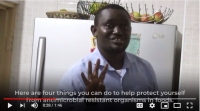
23/11/2020
FAO food safety expert Emmanuel Kabali describes what consumers can do to keep their food safe from microbes that are resistant to medicines like antimicrobials in this short video produced for World Antimicrobial Awareness Week (18-24 November 2020). As he prepares a meal for his family in Lusaka, Zambia, Kabali, who coordinates FAO’s AMR Project, demonstrates ‘the four Cs of food safety’. By cleaning, cooking, chilling, cross contamination – he explains – consumers can do their part to keep antimicrobials, such as antibiotics and antifungals, working.
Watch the video: https://youtu.be/Hl7iGCxaA3Q
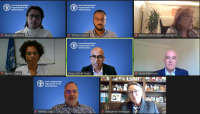
23/11/2020
People from all over the globe tuned into an FAO-hosted webinar entitled “The impact of climate change on food safety” on 17 November 2020. In introducing FAO’s pioneering efforts to compile the scientific evidence showing that climate change is exacerbating food safety hazards, Jamie Morrison, FAO Director of the Food Systems and Food Safety Division, anticipated that the hazards considered are: foodborne pathogens and parasites, harmful algal blooms, pesticides, mycotoxins, and heavy metals.
Vittorio Fattori and Keya Mukherjee, FAO experts in food safety, summarized the key findings of the recent publication, Climate change: Unpacking the burden on food safety, which documents...

20/11/2020
This year the 7-day annual campaign previously known as World Antibiotic Awareness Week has undergone a change in name. World Antimicrobial Awareness Week (WAAW) is taking place on 18-24 November 2020 to promote the reduction of antimicrobial use so as to maintain their efficacy. Every year for the occasion, FAO, alongside the World Health Organization and World Organisation for Animal Health, leads a global information-sharing initiative.
We spoke with Jeffrey LeJeune, FAO Food Safety Officer, to better understand what is at stake and what we can do.
Let’s start with: Why did they change the name this year?
Many people are familiar with...

17/11/2020
The Joint FAO/WHO Expert Committee on Food Additives (JECFA) wrapped up its 90th session on 6 November 2020, having assessed the suitability of transporting certain commodities prior to edible fats and oils. In particular, the experts focused on whether there could be any adverse human health effects from a possible carry-over of residues from what was shipped in the previous cargoes.
JECFA Members are prominent scientists from across the world who convene to evaluate the safety of food additives, contaminants, naturally occurring toxicants and residues of veterinary drugs in food. The risk assessments they carry out serve as advice to Codex...
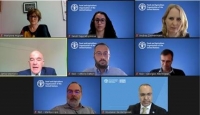
05/11/2020
FAO officers presented the publication, Understanding international harmonization of pesticide maximum residue limits with Codex standards, at the margins of a World Trade Organization (WTO) meeting today, that of the Committee on Sanitary and Phytosanitary Measures, also called the SPS Committee.
Vittorio Fattori, FAO Food Safety Officer, explained that despite longstanding efforts towards international harmonization of allowable thresholds for pesticide residues in foods, differences in national implementation of maximum residue limits (MRLs) continue to exist, raising questions with regard to their impact on trade. To shed light on this complex issue, FAO conducted an analysis, using rice as a case study, he said.
Many...

05/11/2020
Food safety experts will gather for four virtual sessions in November 2020 to discuss ‘regulating, delegating and participating’. Registration is now open and those interested from the public sector, food business, academia, research, consumer groups and non-governmental organizations as well as national, regional and international partners including United Nations families are welcome to attend.
The dates are: 17, 19, 24 and 26 November 2020.
Read more and access registration here
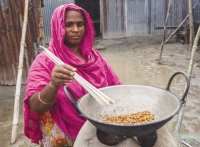
26/10/2020
Record-breaking temperatures, droughts, wildfires, hurricanes, melting glaciers and rising sea levels make the news in countries around the world. All too often we experience extreme weather events. We may be aware of the implications they have on the production or availability of food, but what about its safety?
To answer this question, earlier this year FAO published Climate change: Unpacking the burden on food safety, an update of a 2008 study. This compilation of current information shows the effects that climate change has on various food safety hazards and...
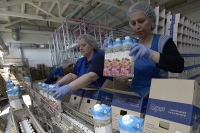
23/10/2020
The FAO/WHO International Food Safety Authorities Network (INFOSAN) has released a new publication for its members to recognize the trends of food safety issues in international food trade and to provide a holistic overview of the global activities carried out through the Network. Outlining the landscape of foodborne disease and INFOSAN’s efforts, the publication will allow for countries to better shape their national strategies and actions in managing international food safety incidents and emergencies.
The publication, INFOSAN Activity Report 2018/2019, starts with statistical analyses of food safety incidents notified and managed through INFOSAN over the last five years. It then goes...
Stay up to date and connect to our RSS feed!
